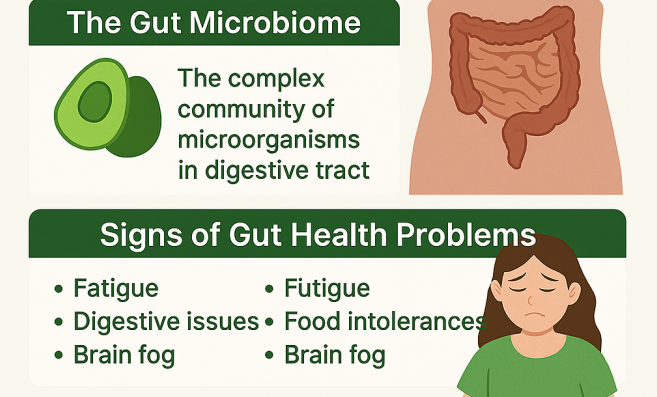Gut health plays a vital role in keeping our bodies ticking along smoothly. It’s not just about digestion—your gut influences immunity and even your mood. Its importance is right up there with all the big players in maintaining overall well-being.
The gut, or gastrointestinal (GI) tract, is quite the network. It runs from your mouth all the way to the colon, including the stomach and intestines along the way. Everything that goes in moves through this system, where the magic of digestion happens food breaks down, nutrients soak into our bloodstream and out goes the waste.
But the gut does more than just manage what you eat. It’s home to about 70% of our immune cells, a literal powerhouse when it comes to defending your body against illness. It’s also the HQ for trillions of microbes that contribute to your metabolism, help make essential vitamins like B12 and K and fend off invaders.
Keeping the gut in tip-top shape means efficient nutrient absorption, strong immunity, and keeping inflammation at bay. It’s a good idea to think of your gut as the foundation of your body’s operations. Taking care of it sets the stage for better health across the board.

Recognizing the Red Flags: Signs Your Gut Might Be Unhealthy
Your gut’s way of saying ‘something’s off’ can take many forms. You might notice digestive issues like bloating, gas, or inconsistent bathroom visits, which can be frustrating and uncomfortable.
Beyond the obvious, your skin might start acting up too. Breakouts or eczema could be your body’s way of alerting you to gut trouble. Surprisingly, the brain-gut connection is real, meaning mood swings or feeling blue might tie back to gut health.
When these signals pop up, it’s crucial to listen to your body. Ignoring them could lead to bigger health concerns down the line. Keeping a food diary or jotting down symptoms as they occur can help spot patterns and figure out what’s triggering your gut distress.
Severe issues, persistent symptoms, or anything unusual should push you to reach out to a healthcare professional. They can guide you through necessary tests and help build a plan to get your gut back on track.
Essential Strategies to Maintain and Restore Gut Health

Keeping your gut in stellar condition often starts with what you put on your plate. Probiotics, those friendly bacteria found in foods like yogurt and kefir, encourage a balanced gut environment. Then there are prebiotics, essentially the good bacteria’s favorite meal, found in foods like garlic, bananas, and asparagus. Together, they help maintain a robust gut microbiome.
Moringa is a less talked-about but powerful ally in gut health. Rich in antioxidants and anti-inflammatory compounds, adding this nutrient-dense plant to your diet can help repair the gut lining and support microbial equilibrium.
Lifestyle habits also play a huge part. Drinking enough water aids both digestion and nutrient delivery, while adequate sleep allows your gut to regenerate. Stress can throw your gut into chaos, so activities like yoga or meditation could really help. Regular exercise not only keeps you fit but also boosts gut motility and fosters a diverse microbiome.
It’s smart to steer clear of processed foods, excess sugar, and unnecessary antibiotics, as these can disrupt your gut’s delicate balance. They’re the troublemakers that tend to weaken the beneficial bacteria count, leaving your gut vulnerable.
Bringing all these elements together can create a harmonious environment within your gut, which sets the stage for overall better health. It’s a balancing act but one that’s worth the effort for long-term wellness.
Addressing Common Gut Ailments: Understanding and Solutions
Understanding your gut’s cry for help involves a bit of detective work with ailments like IBS, IBD, GERD, and others making the list. Catching them early can be a real game-changer.
IBS, or irritable bowel syndrome, is notorious for causing bloating and unpredictable bathroom habits. Tackling it often means following a low FODMAP diet, cutting out stress, and sometimes adding probiotics for balance. Peppermint oil can also offer relief from discomfort.
Inflammatory Bowel Disease (IBD), including Crohn’s and ulcerative colitis, demands a lengthy battle plan. Anti-inflammatory diets rich in omega-3s, combined with medication, are often necessary to manage these conditions effectively.
When heartburn strikes, GERD might be your culprit, needing dietary tweaks to dodge triggers like spicy foods. Portion control and short-term use of antacids or proton pump inhibitors might offer some much-needed comfort.
Small Intestinal Bacterial Overgrowth (SIBO) can give your belly a hard time with symptoms like bloating and diarrhea. Usually, a combination of antibiotics and dietary changes helps restore order.
Food intolerances often show up in disguise, causing discomfort without obvious links. Elimination diets can pinpoint triggers like lactose or gluten, and enzyme supplements help manage symptoms better.
Paying attention to your body’s reactions and seeking medical guidance is key to tackling these gut issues. Personalized solutions provide the best results and keep things manageable in the long run.
Holistic Approaches to Gut Health: Drugs, Herbs, and Foods

Balancing conventional medicine with natural remedies can be a powerful way to support gut health. In some cases, medications like antacids and antibiotics are necessary, but they should be used judiciously to avoid disrupting the friendly bacteria that keep things balanced.
Natural options like herbs and supplements often play a supporting role. Moringa shows promise with its anti-inflammatory and digestive benefits. Ginger is a classic go-to for calming nausea and aiding digestion, while turmeric, loaded with curcumin, works wonders in managing inflammation. For those looking for something soothing, aloe vera juice can ease the gut lining, provided it’s taken in moderation.
A diet rich in specific foods can fundamentally strengthen the gut. Sipping on bone broth helps repair the intestinal lining thanks to its collagen content. Omega-3s from fatty fish or flaxseeds are known for combating inflammation. Don’t overlook polyphenol-rich foods like berries and dark chocolate; they promote microbial diversity, which is crucial for a thriving gut.
Creating a varied, balanced diet with these components can naturally fortify gut health. While each ingredient offers unique benefits, their collective power lies in their ability to nurture the gut holistically.
Taking a comprehensive approach by combining modern medicine with time-trusted natural remedies and nutritional strategies ensures the gut remains healthy, fostering overall wellness.
Pro Tip: Pair moringa with probiotics for a gut-health power duo:
- Add 1 tsp moringa powder to probiotic-rich foods like yogurt or kefir.
- Seed DS-01 Synbiotic for a combined prebiotic + probiotic solution.
- If you prefer the Moringa Capsules, get them HERE
By prioritizing gut health, you’re not only tending to physical ailments but also cultivating mental wellness, demonstrating the comprehensive power this ‘second brain’ holds in everyday life.
“Here is a little transparency: Our website contains affiliate links. This means if you make a purchase, we may receive a small commission. Don’t worry, there is no extra cost to you. It’s a simple way you can support our mission to bring you quality content”
